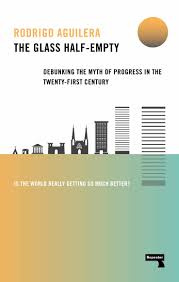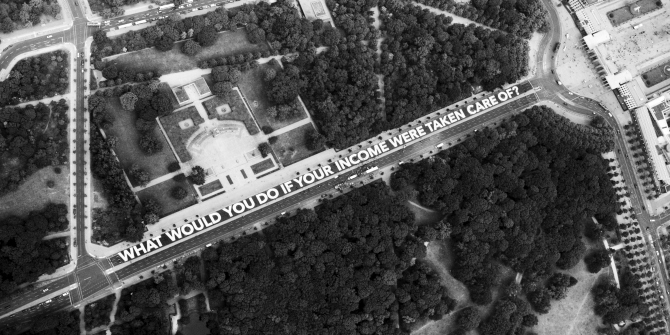In The Glass Half-Empty: Debunking the Myth of Progress in the Twenty-First Century, Rodrigo Aguilera challenges the arguments of the ‘New Optimists’, showing their progress narrative to be a conservative defence of the status quo that is ill-equipped to deal with pressing socioeconomic problems. In making clear that we do not live in the best of all possible worlds, this deep analysis offers a refreshing perspective on complex political and economic phenomena, writes Elena Cossu.
The Glass Half-Empty: Debunking the Myth of Progress in the Twenty-First Century. Rodrigo Aguilera. Repeater Books. 2020.
 What do the ‘alt-right’ and Bill Gates have in common? Apparently, according to Rodrigo Aguilera, it is a fondness for authors that use ‘irrefutable statistical evidence that the world is better than ever’ (5). This belief is also the main element of the movement that Aguilera terms ‘New Optimism’ in his book, The Glass Half-Empty. Quoting Oliver Burkeman’s 2017 Guardian article, ‘Is the World Really Better than Ever?’, Aguilera defines the New Optimists as ‘the loose but growing collection of pundits, academics and thinktank operatives who endorse this stubbornly cheerful, handbasket-free account of our situation’ (3).
What do the ‘alt-right’ and Bill Gates have in common? Apparently, according to Rodrigo Aguilera, it is a fondness for authors that use ‘irrefutable statistical evidence that the world is better than ever’ (5). This belief is also the main element of the movement that Aguilera terms ‘New Optimism’ in his book, The Glass Half-Empty. Quoting Oliver Burkeman’s 2017 Guardian article, ‘Is the World Really Better than Ever?’, Aguilera defines the New Optimists as ‘the loose but growing collection of pundits, academics and thinktank operatives who endorse this stubbornly cheerful, handbasket-free account of our situation’ (3).
The question posed in the title of Burkeman’s article is also the puzzle at the centre of The Glass Half-Empty, which is about progress. In the Introduction and Chapter One, Aguilera describes who has faith in the economic progress narrative, and why. He then reviews the concepts underpinning this way of thinking in Chapters One and Two, before exploring if these claims are statistically or philosophically true in Chapters Three, Five and Six. Aguilera also examines the way these ideas are exploited by modern political movements in Chapters Four and Eight. He concludes with some possible economic alternatives to the current status quo.
What does it mean to believe in progress? It means to ‘present statistical facts that demonstrate the material and moral improvement of humanity; imply that those who deny, or question progress have no rational claim for so doing; and attribute this progress to the causes that fit your beliefs’ (4). It consequently implies the defence of the status quo and the belief that science or liberalism can solve all of our human problems.

This culture of venerating progress can be divided into two groups. The first are ‘the libertarians who tend to attribute progress to capitalism, particularly in its more laissez-faire manifestations’ (4), like some centrist mainstream media (for instance, the Economist). The second are those who believe that Enlightenment values like science and reason are not only the sole causes of progress, but think that these are threatened by both the right (obsessed by authoritarianism) and the left (obsessed with feelings and social constructs rather than facts). The best representative of this way of thinking and the risks associated with it is Steven Pinker, who is mentioned more than 74 times throughout the book. A related group is composed of populist leaders, ‘alt-right’ movements as well as academics and media commentators like Jordan Peterson, Joe Rogan and Ben Shapiro, who manipulate Enlightenment values and science in different ways to achieve different political purposes.
The general problem with these groups is connected to the recent tendency in policymaking to reduce ‘complex inter-disciplinary problems to reductionist cost–benefit analyses’ (6). This tendency is in turn motivated by an increase in determinism in the social sciences, fuelled mainly by the mainstream economics discipline and its belief that we know what brings us prosperity. However, the misidentification of the paths to human progress might lead us to rationally commit self-annihilation by ignoring phenomena like climate change.
Another important problem regarding progress concerns its definition. We do not have a shared definition, but even if we define progress as an improvement in development indicators, as often happens, we should consider the following facts. First, progress has been slow for most of human history. Second, the reasons behind progress in the Global South are often misunderstood: ‘although progress has not been even, for enough people in enough countries it has been either visible throughout their lifetimes or just enough to lift them out of utmost squalor. Perhaps if we were to leave it at that, then the progress narrative would be easier to embrace. Unfortunately, it has been conveniently tied to a rather pernicious talking point: that this has been achieved almost entirely thanks to liberal capitalism’ (65).
In fact, Aguilera writes, ‘we cannot ignore that most of the reduction of global extreme poverty in the last half century has been in Asia. And specifically, in a single country: China’ (68). ‘Taking China out of the equation we have it that the global poverty rate barely budged: 56.7% to 50.3%’ (72). China is not exactly a big fan of liberal capitalism. As a consequence, it is incorrect and dangerous to believe that these improvements are caused by an increase in liberalisation, trade or foreign aid, or that we know what caused them at all.
There are similarly dangerous narratives regarding the Global North, which often exclude how the cost of education, healthcare and housing – and inequality overall – is increasing. These also often ignore how the ‘productivity growth in many Western countries has slowed down or even turned negative in the post-crisis years’ (59). In the very relatable words of Aguilera: ‘if you are a young professional in the Western and especially the Anglo-Saxon world without the benefits of a trust fund or a generous grandfather’s loan to kick start your real estate ambitions, you have a right to be angry’ (64).
In general, the main takeaway of the book is that there is no ‘rational’ way to look at facts and statistics. Theories are a constant act of ‘putting facts together’ based on heuristics and available information. Such a process should never be taken for granted. Many believers in progress do the opposite, creating an unbreakable echo chamber. To prove this point, Aguilera also takes time to summarise the different biases that we all have. If you believe you are superior to this discussion about biases, do not worry. You are probably affected by the ‘bias blind spot’, which is a bias that leads people to believe they are less likely to fall for cognitive biases than they actually are.
Alternatively, if you wholeheartedly agree with intellectuals like Pinker, you might be afflicted by the Just World Hypothesis (‘The belief that the world is fundamentally just and that people generally receive just deserts for their actions and behavior’ (48)), as well as other type of biases clearly explained by the author. There are in fact many mechanisms that prevent us from seeing complexity and being rational, and we should be especially careful to acknowledge what we do not know, instead of claiming we have a perfect solution for anything.
Aguilera gives us different answers on what could be done to change this dead-end, focusing particularly on the problems afflicting the West. First, we need to honestly check our biases and admit that liberal capitalism has a particular resistance to acknowledging its disenfranchising aspects, while being very good at overplaying its positive achievements:
capitalism is certainly efficient at producing things; which is why it was the driving force behind the rising material prosperity of the world in the nineteenth and twentieth centuries. But it is also very effective at creating scarcity in markets where rent can be extracted without moving a finger, such as land and housing (137).
Second, we need to start thinking differently about more sustainable alternatives such as social capitalism, changing the set of incentives that motivate firms, creating more employee-owned firms, property-owning democracy and participatory budgeting. Other solutions, relating to the problem of automation as an example, include Universal Basic Income, a negative income tax, Universal Basic Services or the idea of sovereign wealth funds. Aguilera overall believes in a future where a more compassionate form of capitalism is possible, but he warns us of the perverse effects of ‘woke capitalism’ (the belief you can change the world through your purchases) as a possible solution.
In conclusion, The Glass Half-Empty extensively shows us that no, we do not live in the best of all possible worlds, and neither liberal capitalism nor Enlightenment values are the sole reason for the improvements we may have experienced so far. Equally importantly, these are not the only things that will save us. This book is a deep analysis with no definite solution, as this would contradict the book’s own premise. However, what this book does is give us a perspective on complex political and economic phenomena, while engaging in a central debate about economic development. It is a refreshing take on a theoretical level regarding whether economics should focus less on results and more on understanding the links between cause and effect, and on a practical level for thinking about the future of populism and global governance.
Note: This review gives the views of the author, and not the position of the LSE Review of Books blog, or of the London School of Economics.
Image Credit: Photo by manu schwendener on Unsplash.








Great review of an important book!